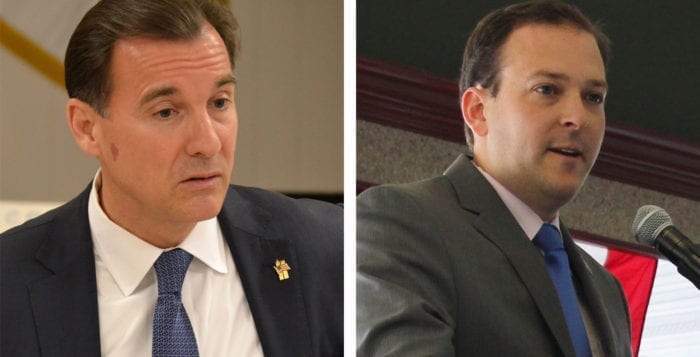Zeldin votes ‘yes’, Suozzi ‘no’ on health care bill
The second attempt passes House, will head to Senate for further scrutiny

The battle to repeal and replace the Affordable Care Act, commonly referred to as Obamacare, was left in the hands of the House of Representatives for a vote last week, and two representatives for the North Shore had differing opinions on the bill. The American Health Care Act passed in the House by a slim 217 to 213 margin, though before it becomes law it must also pass the Senate and ultimately be signed by President Donald Trump (R).
U.S. Rep. Lee Zeldin (R-Shirley) for New York’s 1st Congressional District was among those in favor of the bill, fulfilling a campaign promise of his own and the vast majority of Republican lawmakers across the country since Obamacare was enacted in 2010.
“Almost everyone agrees that our current system is deeply flawed,” Zeldin said in a statement. “The American Health Care Act provides relief from billions of dollars of crushing taxes and mandates enacted under the ACA. Additionally, the bill repeals the individual and employer mandates, taxes on prescription and over-the-counter medications, health insurance premiums and medical devices.”
“The revised version of the AHCA passed by the House is not sound health reform. … Access to insurance is meaningless if premiums are unaffordable and the coverage is not comprehensive.”
— Kevin Dahill
Zeldin also sought to dispel “outright lies” being perpetrated on social media and elsewhere about the new bill, the first incarnation of which he was slow to support unless important amendments were added, he said in March. One thing he specified as a misconception is the idea that people with pre-existing conditions might lose coverage, or that millions will be left uninsured.
“The bill protects people with pre-existing conditions, and gives states greater flexibility to lower premiums and stabilize the insurance market,” he said.
Critics of the bill have noted it was not subject to scrutiny by the Congressional Budget Office prior to the vote, and in the first version that nearly reached a vote in March, the CBO suggested about 24 million people were in danger of losing their coverage.
An amendment to the bill the second time around introduced by U.S. Rep. Fred Upton (R-Michigan), would establish funds for a “high risk” pool, which would be used to provide coverage for people with pre-existing conditions.
“The high-risk pool plan is an attempt to cover up for another provision in the bill, via an amendment by New Jersey Rep. Tom MacArthur (R), that would allow states to easily waive protections for Americans with pre-existing conditions in the individual market if they experienced a gap in coverage,” according to the Center for American Progress, a nonpartisan policy institute.
U.S. Rep. Tom Suozzi (D-Glen Cove), of New York’s 3rd Congressional District, was among those critics. He voted against the bill.
“I’m disappointed that House Republicans chose not to work with Democrats to create a common-sense bill,” Suozzi said in a statement. He also called on the Senate to disregard the legislation and focus on working toward a bipartisan solution.
“It will result in skyrocketing premiums, higher out-of-pocket costs, a discriminatory age tax and will steal from Medicare,” he said. “And all of this was done without an updated Congressional Budget Office score to determine how much the new amendment to the bill will cost taxpayers.”
Suozzi also addressed what it might mean for New Yorkers.
“For New Yorkers, this legislation leaves 2.7 million people without proper access to health insurance,” he said. “$4.7 billion will be cut from our state’s Medicaid budget, putting seven million people who rely on Medicaid services and other important programs at risk. This is a bad bill for New Yorkers, plain and simple.”
The bill establishes limits on federal funding for state Medicaid programs beginning in 2020. States that exceed the cap would be subjected to reduced federal funding in the following fiscal year, according to the summary of the bill.
The most notable changes in the new health care plan compared to the existing one include an elimination of the individual mandate, which required all Americans to purchase health insurance or be subject to a fine — a sticking point for many Republicans on Obamacare; a cut of federal Medicaid funding for Planned Parenthood for one year; adjusting tax credits based on age instead of income; and shifting Medicaid expansion set forth by Obamacare to the discretion of states instead of the federal government, among many others.
According to a map on the website of the Kaiser Family Foundation, a nonprofit organization established to deliver health policy analysis to the public, issuing tax credits based on age instead of income will result in some lower income Americans paying more for coverage.
“Generally, people who are older, lower income or live in high-premium areas receive less financial assistance under the AHCA,” analysis of the bill by the foundation said. “Additionally, older people would have higher starting premiums under the AHCA and would therefore pay higher premiums. Because younger people with higher incomes and living in lower-cost areas would receive more financial assistance and would have lower starting premiums on average, they would pay lower premiums on average.”
Kevin Dahill, president and CEO of Suburban Hospital Alliance of New York State, an organization that represents the advocacy interests of Long Island health systems including St. Catherine of Siena in Smithtown, and John T. Mather Memorial and St. Charles hospitals in Port Jefferson, issued a statement regarding the House bill.
“The revised version of the AHCA passed by the House is not sound health reform,” he said. “About 70 percent of Medicaid spending in our state covers care for the elderly and disabled, including children. These people will still need care. And even more disheartening is the amendment to cut $2.3 billion in Medicaid funding by shifting the cost burden from the counties to the state. This amendment was advanced by [Republican] New York Congressmen [John] Faso and [Chris] Collins and it leaves a huge hole in New York’s budget. … Access to insurance is meaningless if premiums are unaffordable and the coverage is not comprehensive.”
Dr. Gerard Brogan Jr., executive director at Huntington Hospital, said he would put the ACA and AHCA in the same category as flawed legislation during a phone interview. He also reiterated Dahill’s concerns that the changes put a large number of people at risk of losing their access to adequate care because of changes to Medicaid.
“There are portions that are either not derived from sound assumptions or won’t accomplish what are the issue that we need to deal with,” he said.






